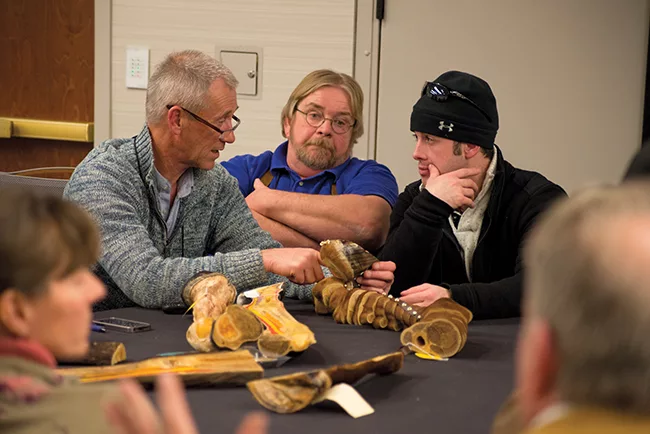The definition of continuing education is as it reads — there’s no mystery there. Farriery is a lifelong endeavor, but sadly there are many farriers who believe that once they can trim or nail a shoe on a horse, they are done learning. Nothing could be further from the truth. Trimming a hoof, shaping a shoe and nailing it on are just the beginning. Only then are you ready to really start learning.
Let’s go back and discuss how one starts learning to become a farrier. The two methods that are most commonly used are the apprentice system and the formal farrier school system. Actually, many farriers have learned from a blend of both. Each has its advantages and disadvantages.
The apprentice system provides a lot of hands-on, practical on-the-job experience. Unfortunately, experienced farriers who take on apprentices are in business, so their first priority is to teach their apprentice to become helpful. This usually means pulling shoes, clinching/finishing and doing non-critical work. Seldom is trimming, fitting or nailing done on clients’ horses.
Another weak point of apprenticeships is that the senior farrier usually performs very specific ranges of shoeing work, so this narrows the viewpoint of the apprentice. Other breeds or uses of horses are left out of the picture.
Farrier schools also have their weaknesses. Often the duration of the course is too short to develop real competency. Some schools only focus on the type of horses found in a given area, which may not be the same types of horses that are available to graduates when they return home.
Some schools use the “shotgun” approach, teaching many aspects and types of shoeing, but providing little practice in these varied styles.
Schools do provide a structured course and a facility for the students to develop. The simple fact is learning how to shoe horses well is a difficult undertaking.
Keep Fresh
The best way to fill in the gaps of the education process is to regularly participate in continuing education. Most other professions require this to maintain competency and certifications. Too often farriers get comfortable with their skills and drift off into a state of mediocrity. Farriers shoeing for 10 years without continuing education exposure are usually repeating their first year 10 times.
Continuing education provides many avenues for improving skills. First, you are with other farriers who are dedicated to learning more. This alone provides a positive stimulation and exchange of ideas. The featured programs provide many new approaches to everyday challenges, which become like new “tools” in your toolbox.
Research is constantly emerging that furthers our understanding of the horse’s foot and how to better care for it. Shoeing in a vacuum deprives you of innovations. The best way to discover new products and get free samples is at the trade shows that accompany many continuing education venues.
The business of horseshoeing often involves long, hard days. It is easy to get into a “rut” and just get the work done the easiest and quickest way possible. Being around other farriers who have the same problems makes life easier and seeing other farriers who have excelled provides inspiration.
Having been to many continuing education sessions, I can certainly vouch for this. In fact, I see many of the same successful farriers over and over at continuing education events. Often the farriers who really need some improvement are absent.
Ideas For Continuing Education
There are many ways to continue your hoof-care education. There are many state and regional farrier organizations — all it takes is a phone call or email to find out when and where meetings are held. These groups are usually very friendly and welcome new participants. Clinics or certifications often are offered through these organizations.
Next, there are larger events such as the International Hoof-Care Summit, American Farrier’s Association convention, International Equine Conference on Laminitis and Diseases of the Foot and more. Again, many of the most successful farriers attend these events. These farriers are successful, in part, due to their regular attendance.
The cost to attend is an investment in their business. Beyond demonstrations and lectures, many attendees find the most valuable reason to attend a national conference is the endless opportunities for networking.
Another way to acquire continuing education is to become a member of the American Association of Professional Farriers. They require 24 yearly continuing education credit hours to maintain accreditation. These credit hours only can be obtained through approved events.
Membership in the American Farrier’s Association also provides access to continuing education events.
A structured way of continuing education is through one of the many farrier schools that offer short advanced courses. For instance, at the Cornell University Farrier School, 1- or 2-week courses are offered to experienced farriers to prepare for certification, learn shoe-forging techniques, glue-on technology or just to tune up their skills.
Many farriers and veterinarians have published videos on YouTube that cover a wide range of farriery and horsemanship topics. Watching these videos is a terrific way to learn and see things that are not in your normal work.
One of the easiest ways to gain continuing education is to read American Farriers Journal. That is the real lifeline to most of the opportunities described here. The magazine connects individuals to the whole industry, providing valuable information in the form of articles, editorials and advertising.
Beyond videos, there are many opportunities elsewhere on the Internet. Facebook has become a popular way for farriers to share information and document their work. Several websites have message boards where farriers discuss hoof care. However, be careful using Internet sources as there is no legislation of misinformation published on the Internet.
Continuing education is required if you want to reach your full potential as a farrier. If you still are in doubt as to whether continuing education is necessary to improve your business, think about your competition. If you are staying home being stagnant, they are at clinics, conferences and partaking in all the other opportunities you are ignoring.








